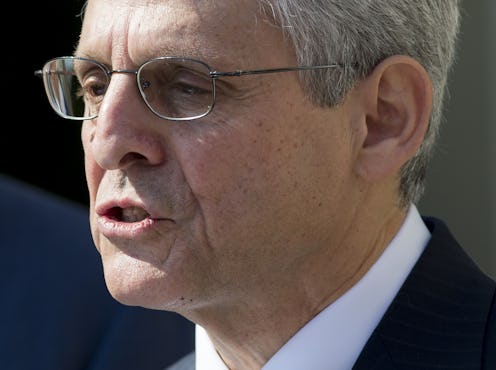News
How Garland Might Rule On Immigration
The odds are slim that the Senate will confirm Merrick Garland, President Obama's nominee for the vacant Supreme Court seat, anytime soon. But there's still an outside possibility that Republicans will relent and give him a hearing, and that has everybody scrutinizing Garland's record for hints about his judicial philosophy. Given that the high court is set to rule on President Obama's executive orders on immigration later this term, it's natural to ask: What are Merrick Garland's views on immigration?
The bad news is that Garland's history reveals very little about this — he hasn't ruled on any significant immigration cases. But that doesn't leave us totally in the dark, because based on Garland's past rulings in other areas of law, we can come to a tentative conclusion as to how he might rule on Obama's immigration order.
Quick refresher: Obama announced an executive action in 2014 wherein certain undocumented immigrants — about 5 million in total — would be temporarily shielded from deportation. Conservatives sued the administration, arguing that Obama overstepped his Constitutional authority in issuing the order. The case made its way to the Supreme Court, which is set to rule on it in April.
Garland's past rulings give no hints as to his views on immigration specifically. But they do offer a clue as to how he might rule in a case like this. As a judge on the D.C. Circuit Court of Appeals, Garland has generally been deferential to the executive branch's interpretation of statutes. Garland sided with the George W. Bush administration in a case involving prisoner rights at Guantanamo Bay, and has upheld the Obama administration's interpretation of environmental law on numerous occasions.
The immigration lawsuit in front of the court is, at its heart, a question of whether the administration is correctly interpreting the law. That being the case, there's reason to believe that Garland, if he were to rule on this case, would side with the administration.
However, the odds that Garland will hear this case are very slim. Although the case is on the docket for this term, it's scheduled to be heard on April 18. Even if Republicans relented and decide to give Garland a hearing — and there are no signs that they will — he'd have to get confirmed in less than 30 days in order to hear the immigration case. A SCOTUS nominee hasn't been confirmed that quickly since the Ford administration.
All of this emphasizes one of the biggest difficulties in trying to predict how potential Supreme Court nominees will rule. Unlike politicians, judges don't simply form an opinion on an area of policy and vote in accordance with that opinion. They have to look beyond simple ideological conclusions and analyze the legal underpinnings of the specific policy that's being challenged. Garland would probably uphold Obama's immigration order — but that has more to do with how the orders were enacted than the merits of what it seeks to accomplish.
